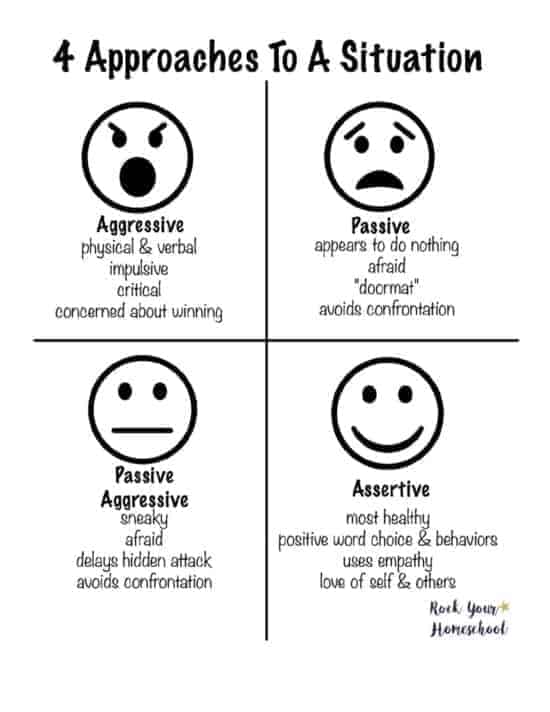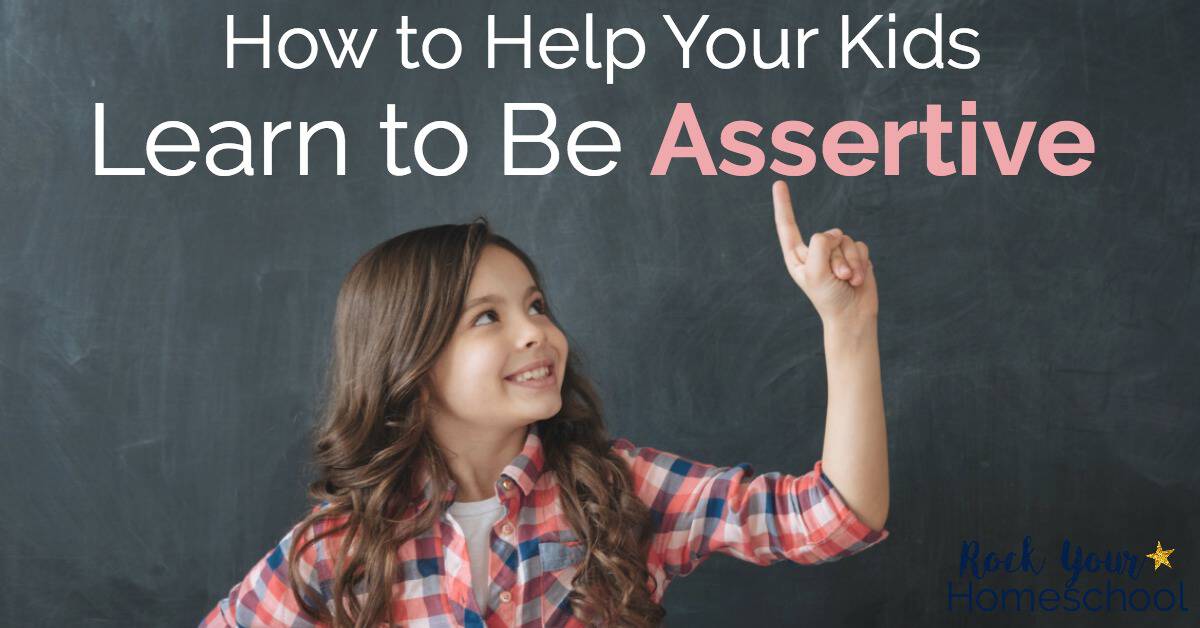How To Help Your Kids Learn To Be Assertive
This post may contain affiliate links. Please read my disclosure statement. Thanks for visiting!

You CAN help your kids learn to be assertive! Discover how these tips and recommendations can be used to teach your kids on positively interacting with siblings, friends, and even bullies. Make sure your kids have the skills they need to stick up for themselves and so much more.
This post on How To Help Your Kids Learn To Be Assertive is part 3 of a 4-part blog series. Assertiveness 101 was covered in How To Be Assertive & Why It Can Help Your & Your Family. Part 2 pertained to helping adults learn to be more assertive in their everyday lives. Part discusses how to be assertive in our modern world with an emphasis on social media, texting, and email.
Your kids belong to an entirely different generation. They face obstacles that you never had to handle. Modern technology and culture have placed incredible demands upon your children's attention and preferences.
Today's child is also faced with challenges that you did have to deal with when you were a kid. Of course, Family relationships, particularly siblings, may occasionally have the normal conflict or disagreement. Friendships can waver as young ones learn to navigate these relationships with their peers. The hardest interactions for kids of any generation are bullies.
When you turn on the news, you're sure to hear a story with a sad ending due to the negative effects of bullying. Unfortunately, the systems that are in place to help prevent bullying don't always work. And too many kids end up falling apart under the pressure.
You don't want that to happen to your children. You want to empower your kids with tools and skills to be assertive and use effective language and behaviors to stand up for themselves. You want your kids to learn how to communicate their thoughts and feelings, especially in times when they are threatened or mistreated.
What can you do? Well, you don't have to feel helpless. You can take steps to help your kids develop strong assertiveness skills.
Why You Need To Help Your Kids Learn To Be Assertive
Assertiveness is a learned skill. A few lucky individuals learn how to be assertive from positive relationships with their families or friends. Most people, however, have been exposed to the other three types of negative approaches to situations.
When you teach assertiveness skills, you're gifting your kids with positive skills that they can carry with them for life. Kids learn to express their thoughts and feelings in a manner that represents who they are and what they stand for.
You have probably noticed that a child's first conflict with another individual will arise in their family. A child will often develop their first disagreement or problem with a parent or a sibling.
When your kids reach school age or a bit younger, they may experience their first conflict with individuals outside of your family. Daycare, preschool, church, and other social activities place your kids in situations to develop friendships with their peers. Your kids need to learn to interact with other kids in a positive way to cultivate friendships while maintaining their self-esteem and expression of needs.
Your kids must learn how to stand up for themselves, express what they will or will not tolerate, and react in a controlled way. Assertiveness training can help your kids be prepared to handle bullies and other nasty characters.
How To Help Your Kids Learn To Be Assertive
There are 4 ways people approach a situation. Explain to your child the different approaches and why being assertive is most healthy. The first step to help your kids be assertive is to help them learn how to identify their emotions.
The first step to help your kids be assertive is to help them learn how to identify their emotions.
Describe what it feels like to be anxious, sad, angry, and disappointed. Use descriptive words to convey these feelings. (If you need help, Gifts of Curiosity has 4 Feeling Activities For Kids that are excellent.)
Second, help your kids recognize when they feel uncomfortable in an interaction with another or group. Examples of feeling uncomfortable would be:
- butterflies in your stomach
- upset stomach
- anger
- fear
- confusion
These examples are just a few of the ways your kids may feel uncomfortable. Open the discussion to allow them to express their thoughts on what it is like for them. Let them know that there is no wrong answer. Their feelings are their own and it is okay.
Next, help your kids learn to be assertive by teaching them the appropriate moments to act. What is an appropriate moment? Ideally, when both individuals are calm and receptive to discussion.
If an ideal moment does not present itself, tell your kids that it is okay to be assertive whenever necessary. Help your kids know that they are allowed to speak up by using positive communication and behavior in order to defend themselves. Tell them it is never okay for another child or adult to use negative or foul language or actions against them.

Help Your Kids Learn To Be Assertive With These Skills
- Identify the situation: Give your kids the opportunity to practice analyzing a situation. Use movies, T.V. shows, and stories as examples. Guide them to determine the conflict and how the character(s) should proceed in an assertive way. Allow your child to use real-life examples to further analyze and practice.
- Practice assertive responses: Assertiveness is all about self-expression of thoughts and feelings in a positive way that respects the other person. Use fill-in-the-blank examples and allow your child to practice. For example, "I feel ___ when you ____. I need you to ____." Teach your kids to use "I" statements to describe their thoughts and feelings.
- Reflection: You can use this activity as a game. Demonstrate assertive comments and behavior. Have your child mirror your assertive statements. Take turns practicing assertive skills.
- Kind Words Only!: Discuss with your kids that only kind words are allowed. Remind them that negative words like "stupid" are hurtful and can make situations worse.
- Role Play: Take your practicing to a new level! Act out scenes where you demonstrate assertiveness skills. Switch characters and give your child an opportunity to learn. For younger kids (or just for fun!), use puppets or stuffed animals. This approach can work well with any age group because it takes the focus off the child.
- Art: Younger kids can benefit from drawing pictures or using a material like playdough to act out their new assertiveness skills.
- Writing: Older kids may find it helpful to write out their thoughts and feelings prior to practicing and using assertiveness skills. Stories or real-life examples can be written to identify problematic situations and work to an assertive response.
How To Help Your Kids Learn To Be Assertive In Special Situations
Friendships and family are typically safe places to practice assertiveness skills. What about special situations like at school or homeschool co-op or with bullies?
Your kids will want to obey the rules. They should be mindful of when they are allowed to talk or have free time. When possible, your kids should take these opportunities to deliver their assertive messages.
With bullies, your kids can use their assertive skills to yield their personal power. Help them develop positive self-esteem and confidence to recognize why they need to stand up to bullies.
What is a bully? Kids Health defines a bull as one who "might say mean things about someone, grab a kid's stuff, make fun of someone, or leave a kid out of the group on purpose." Bullies may operate on physical, emotional, and verbal levels.
No matter how a bully threatens, your kids can learn and practice assertiveness skills to deal with the situation.
**Reminder: Tell your child to find an adult to help if a bully does not respond in a positive way or if they physically threaten your child. Let your child know that their personal safety comes first!
Kids Health has another article that shares more specific information on Assertiveness for Kids. Signe Whitson shares invaluable tips over at Huffington post on What Does Assertiveness Have To Do With Stopping Bullying?
It is never too early or too late to help your kids learn to be assertive! You can help your kids learn to be assertive and practice positive communication skills.
What questions or concerns do you have about teaching your kids to be assertive? Leave them in the comments section below 🙂

Very informative and interesting article! It seems to me that in order for the children to be persistent, they need to set a proper example! They also need to excel in their studies.
Reminder: Tell your child to find an adult to help if a bully does not respond in a positive way or if they physically threaten your child. Let your child know that their personal safety comes first!
https://rockyourhomeschool.net/